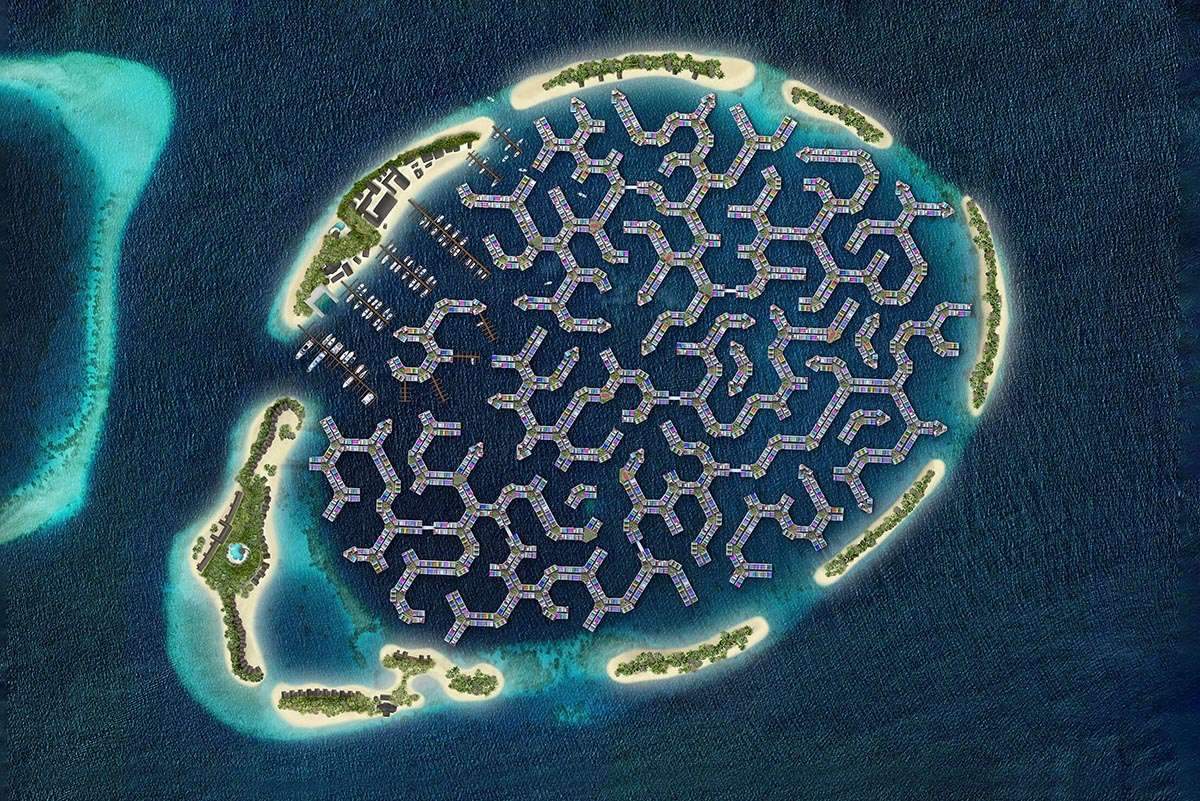Netherlands-based architecture firm Waterstudio is set to build a “first-of-its-kind floating island city” in the Maldives,
resembling a native coral, called brain coral.
Project Features
A new project, called Maldives Floating City (MFC),
was developed by Dutch Docklands Maldives in collaboration with the Government of the Maldives,
with the goal of “mitigating the effects of climate change and rising sea levels” – one of the pressing issues of climate change.
The Maldives is known to have the lowest terrain of any country in the world,
and according to NASA’s Earth Observatory, more than 80% of the 1,190 atolls lie less than one meter above sea level.
The new floating city is designed on a 200-hectare warm-water lagoon,
a 10-minute boat ride from the Maldivian capital, Male and Male International Airport, to be “the first island city of its kind,
offering a revolutionary approach to creating sustainable modern living perched against the backdrop of the azure Indian Ocean.”

Project Description
The brain-shaped project, which is expected to accommodate 20,000 people, has been described as “the world’s first truly floating island city,”
and the multifunctional mall will contain 5,000 low-rise floating units for a mixed-use community that includes residential, hotels, shops and restaurants.
Waterstudio Inspired by traditional Maldivian seafaring culture to create a brain coral shaped city,
the city is designed on a smart grid featuring hexagonal floating units – connected to a ring of lush barrier islands.
This smart grid is designed to be able to respond to dynamic demand, weather and climate change.
Design shape
The geometries of the units are designed with the shapes of local coral that look like the brain from above,
they are planned as “a unique city, above and below the surface of the water,
creating blue habitats that fall and stimulate coral growth.”
The artificial reef banks will be attached to the underside of the floating structure,
which will also allow the reefs to grow naturally.
The concept has also been developed in close cooperation with the authorities of the Maldives,
where a series of hotels, restaurants, elegant boutiques and a world-class marina will support the lives of the vibrant communities.
And so the Maldives Floating City is the first of its kind worldwide – developed to embrace sustainability and equitable living,
while attempts at floating cities have been tried before,
none have emerged as MFC’s most compelling selling points: comprehensive technical, logistical and legal expertise. ”

The design of the world’s first real floating island city in the Maldives
Masterplan is also planned to be constructed using “the most environmentally friendly construction possible”
with MFC planning to provide a “appropriate, scalable and salable solution for a truly sustainable waterfront development”.
The buildings are designed to be low-rise and face the sea – shops,
homes and services are neatly located along tidy, palm tree-lined streets.
The network of bridges, canals and piers will give the MFC an overall sense of cohesion and facilitate easy access to extensive amenities.
During the project, sandy beaches will help stabilize and protect key structures inside the lagoon,
while the massive coral reefs outside will see hotels, restaurants and shops.
New coral reefs will also be planted to act as water barriers, with each housing unit enjoying a sea frontage,
with individual units measuring 100 sq. m – with a roof terrace of 40 sq. m upwards.
As the Dutch company Docklands states, home prices will start at $250,000.
The prices are set to be affordable and affordable,
to attract the largest possible group of potential buyers to take advantage of the project’s enviable coastal location.
Just like the Maldives’ iconic ‘overwater resorts’,
MFC Residences will offer a waterfront lifestyle centered around health, wellness and the outdoors.

The design of the world’s first real floating island city in the Maldives
The scheme is now nearing the end of the planning stages and the MFC plans to begin construction in 2022 and complete it in phases over the next half decade.
Once fully realized, a hospital building, a school and a government building will complement the commercial and residential buildings of the project.
While foreigners will certainly call the MFC their home, perhaps, more importantly,
Maldivians will live there too – the local fishing families who have called the area home for centuries.
Similar projects include the world’s first sustainable floating city:
Oceanix Busan designed by BIG and Samoo, and a floating city in Manoka, Douala – Cameroon.
For more architectural news


 العربية
العربية